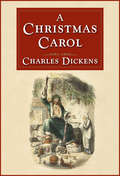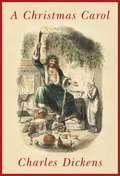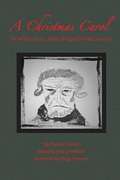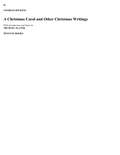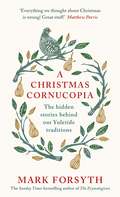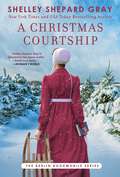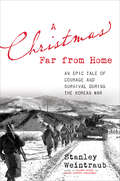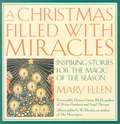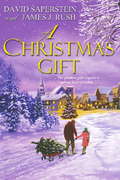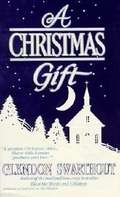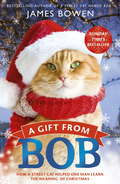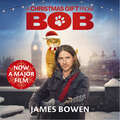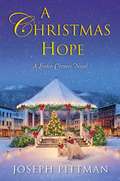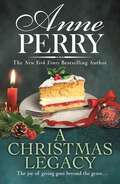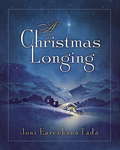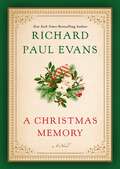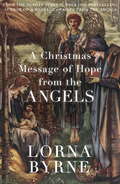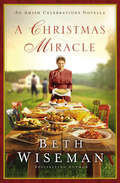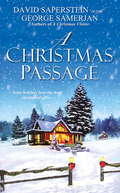- Table View
- List View
A Christmas Carol
by Charles DickensA Christmas Carol was first published in 1843 to great popular and critical acclaim. Ebenezer Scrooge's transformation into a kinder, gentler man after visitations by a series of ghosts has become an inseparable part of Christmas tradition. It seems impossible to imagine what the holiday season would be like without its familiar charms.
A Christmas Carol
by Charles DickensA Christmas Carol was first published in 1843 to great popular and critical acclaim. Ebenezer Scrooge's transformation into a kinder, gentler man after visitations by a series of ghosts has become an inseparable part of Christmas tradition. It seems impossible to imagine what the holiday season would be like without its familiar charms.
A Christmas Carol
by Charles Dickens Jesse KornbluthJesse Kornbluth edited the story book of "A Christmas Carol" written by Charles Dickens from 28000 words to 13000 words to suit the trend of the present generation.
A Christmas Carol and Other Christmas Writings
by Charles DickensPart of Penguin's beautiful hardback Clothbound Classics series, designed by the award-winning Coralie Bickford-Smith, these delectable and collectible editions are bound in high-quality colourful, tactile cloth with foil stamped into the design. After reading Christmas Carol, the notoriously reculsive Thomas Carlyle was "seized with a perfect convulsion of hospitality" and threw not one but two Christmas dinner parties. The impact of the story may not always have been so dramatic but, along with Dickens other Christmas writings, it has had a lasting and significant influence upon our ideas about the Christmas spirit, and about the season as a time for celebration, charity, and memory.
A Christmas Carol: Pop-Up Book
by Charles DickensA very short children's version of the Charles Dickens A Christmas Carol.
A Christmas Cornucopia: The Hidden Stories Behind Our Yuletide Traditions
by Mark ForsythBY THE SUNDAY TIMES NO.1 BESTSELLING AUTHOR OF A SHORT HISTORY OF DRUNKENNESSDiscover the unpredictable origins and etymologies of our Christmas customs this festive season. For something that happens every year of our lives, we really don't know much about Christmas. We don't know that the date we celebrate was chosen by a madman, or that Christmas, etymologically speaking, means "Go away, Christ". We're oblivious to the fact that the advent calendar was actually invented by a Munich housewife to stop her children pestering her for a Christmas countdown. And we would never have guessed that the invention of crackers was merely a way of popularising sweet wrappers. Luckily, like a gift from Santa himself, Mark Forsyth is here to unwrap this fundamentally funny gallimaufry of traditions and oddities, making it all finally make sense - in his wonderfully entertaining wordy way.'Witty and revelatory. Blooming brilliant' Raymond Briggs 'Everything we ever thought about Christmas is wrong! Great stuff' Matthew Parris
A Christmas Courtship (Berlin Bookmobile Series, The #3)
by Shelley Shepard GrayThis charming and gentle Christmas love story in the &“swoon-worthy&” (Woman&’s World) Berlin Bookmobile series follows a librarian determined to help an Amish bachelor woo his neighbor.A solitary sort, forty-two-year-old Atle Petersheim spends his time hard at work in his wood shop. But as the days get longer, he realizes just how lonely he&’s become. When his longtime crush, Sadie Mast, a widow and mother of three, asks him to help her build a room in their barn for her son, Atle can&’t say no. Eager to pursue Sadie at last, he turns to bookmobile librarian Sarah Anne Miller for courting advice. More than happy to help, Sarah Anne decides the best way to learn about love is through books—romance novels to be precise. Between completing holiday orders for her flourishing food business, helping Cale navigate a dramatic new relationship with his boss&’s daughter, and coming to terms with the trauma her late husband had inflicted upon her and her children—not to mention Atle showing up at her door with flowers—Sadie is in over her head. Though Atle&’s efforts are initially clumsy and his declarations a bit awkward, Sadie can&’t help but be charmed by her patient and kind neighbor. But is she ready for love? Another delightful romance about the &“transformative powers of love, hope, and faith&” (Publishers Weekly), A Christmas Courtship is the perfect holiday read.
A Christmas Deliverance: Christmas Novella 20 (Christmas Novella #19)
by Anne PerryNew York Times bestselling author Anne Perry's twentieth heart-warming Christmas mystery.The festive season is fast approaching, and Dr Crowe and his young apprentice Scuff are busy, as always, tending London's sick and wounded. This year, however, Crowe is increasingly distracted by memories of a former patient, Eliza Hollister, for whom he cared deeply. When Crowe sees Ellie being bullied by her domineering fiancé in the street, he is convinced that she is marrying a man she doesn't love, and he is determined to find out why. While Crowe starts his investigations, Scuff is left to run the clinic - with a little help from a rather unexpected source. Forced to enter a dangerous world of blackmail and deception, will Crowe manage to reveal the truth before the bells ring out for Christmas? A Christmas Deliverance is a heart-warming festive mystery set in Victorian London from the pen of the New York Times bestselling author Anne Perry.
A Christmas Engagement: An Amish Romance
by Linda BylerBestselling Amish novelist Linda Byler spins a sweet tale of heartache, disappointment, and ultimately hopes fulfilled at Christmastime. Liz had been in love once, had even been engaged. In fact, the wedding had been planned, the barn cleaned, and the celery was set to be harvested to make the traditional wedding soup. Just two weeks before the day she was to exchange vows with her beloved, he changed his mind, and that was that. The humiliation was almost as bad as the heartbreak. The whole community had celebrated her engagement, had participated in the wedding planning, had started giving her advice on keeping a home and raising children. When the wedding was canceled, no one knew what to say. She had to bear the pitying looks and awkward glances for many months. She vowed never to be such a fool again, never to trust her heart to a man who could just up and leave her with hardly an explanation. She'd rather be an old maid than go through that again. Years pass, and Liz has made peace with her life as a single woman, a "leftover blessing" as the Amish say. She can admit to herself that Matthew, the owner of the Amish restaurant at the market where she works, is handsome. And she is aware that he is single. But she reminds herself over and over that it's not worth feeling anything for the man. He's her boss and that's it. So why does she look forward to work so much every day? And why can't she make her heart beat at a normal pace when he comes near? Linda Byler is beloved for her skillful story telling and true-to-life descriptions of Amish food, faith, and culture. As an Amish woman herself, she can share details of Amish life that few can replicate. In this charming novel, Byler shares intimate details of day-to-day life in an Amish community while spinning a sweet tale of love and hopes fulfilled at Christmastime.
A Christmas Far from Home: An Epic Tale of Courage and Survival during the Korean War
by Stanley WeintraubAn anecdote-rich narrative of the 1950 holiday season during the Korean War, when, just after Thanksgiving, tens of thousands of US troops were surrounded in the Chosin reservoir area by hundreds of thousands of Chinese troops and began a terrible and difficult retreat, which finally ended on Christmas Day.
A Christmas Filled With Miracles
by Mary EllenEXPERIENCE THE LOVE, MAGIC, AND HOPE OF THE HOLIDAY SEASON In A Christmas Filled with Miracles, Mary Ellen continues her discovery of the miraculous that was begun in her best-selling Expect Miracles and brings you a magical, heartfelt gift for the holiday season. This collection of amazing true stories will touch your heart, awaken your memories of the magic of Christmas past, and offer you hope for every Christmas to come.
A Christmas Gift
by David Saperstein James J. RushEvery Christmas is an opportunity to rediscover the true meaning of the season, and the miracles that are the greatest gifts . . . Twelve-year-old Katie Williams has already received an extraordinary holiday gift this year, passed down from her great-grandmother. Katie has been blessed with second sight. So far her visions have helped her avert tragedy, and brought her beloved long-lost Uncle Charlie back to the family--but can they help keep him there? Charlie has a lot to be thankful for this Christmas. Hes back in his hometown and ready for a fresh start. A job as the local mall Santa Claus seems like a good way to begin--until his misguided past comes back to haunt him, dashing his hopes for the future. Can Katie help keep her uncles dreams alive? Christmas Eve will tell, as the love and faith of friends and family--along with a dash of frankincense and myrrh--ignite a powerful magic within every heart. . . a magic that may bring one man the greatest gift of all.
A Christmas Gift
by Glendon SwarthoutIn the tradition of The Cat Who Came for Christmas and A Child's Christmas in Wales, a wonderful story about the true meaning of love and family. Swarthout is the million-copy bestselling author of Bless the Beasts and the Children. Illustrated.
A Christmas Gift from Bob: NOW A MAJOR FILM
by James BowenThe festive standalone from James and Bob, the stars of the bestselling A Street Cat Named Bob. Now a major motion picture starring Luke Treadaway as James and Bob himself.STREET CAT BOB and James, stars of the bestselling A Street Cat Named Bob and The World According to Bob that touched millions of hearts around the world, return in a festive standalone special as they spend a cold and challenging December on the streets of London together in a new adventure.From the day James rescued a street cat abandoned in the hallway of his sheltered accommodation, they began a friendship which has transformed both their lives and, through the bestselling books A Street Cat Named Bob and The World According to Bob, touched millions around the world. In this new story of their journey together, James looks back at the last Christmas they spent scraping a living on the streets and how Bob helped him through one of his toughest times - providing strength, friendship and inspiration but also teaching him important lessons about the true meaning of Christmas along the way.Now a major motion picture starring Luke Treadaway as James and Bob himself, coming November 6.
A Christmas Gift from Bob: NOW A MAJOR FILM
by James BowenThe festive standalone from James and Bob, the stars of the bestselling A Street Cat Named Bob. Now a major motion picture starring Luke Treadaway as James and Bob himself.STREET CAT BOB and James, stars of the bestselling A Street Cat Named Bob and The World According to Bob that touched millions of hearts around the world, return in a festive standalone special as they spend a cold and challenging December on the streets of London together in a new adventure.From the day James rescued a street cat abandoned in the hallway of his sheltered accommodation, they began a friendship which has transformed both their lives and, through the bestselling books A Street Cat Named Bob and The World According to Bob, touched millions around the world. In this new story of their journey together, James looks back at the last Christmas they spent scraping a living on the streets and how Bob helped him through one of his toughest times - providing strength, friendship and inspiration but also teaching him important lessons about the true meaning of Christmas along the way.Now a major motion picture starring Luke Treadaway as James and Bob himself, coming November 6.
A Christmas Gift from Bob: NOW A MAJOR FILM
by James BowenFrom the day James rescued a street cat abandoned in the hallway of his sheltered accommodation, they began a friendship which has transformed both their lives and, through the bestselling books A STREET CAT NAMED BOB and THE WORLD ACCORDING TO BOB, touched millions around the world. In this new story from their journey together, James looks back at an early Christmas they spent on the streets and how Bob helped him through one of his toughest times - teaching him the true meaning of Christmas and bringing home him to in how many ways Bob has saved his life.(P)2014 Hodder & Stoughton
A Christmas Haven: An Amish Christmas Romance
by Cindy Woodsmall Erin WoodsmallFor fans of holiday romances and Amish life comes a new Christmas tale of surprising expectations and discovering miracles.Old Order Amish Ivy Zook is wrestling with her need to shed her community's ways so she can grow the business of her dreams: planning parties. As long as she's stuck living without modernization, she can barely get her business on its feet. But if she leaves too soon, she'd cause trouble for her sister, Holly, who is planning her wedding to Joshua Smucker. All of their plans become twice as complicated when an old car crashes into the storefront of Greene's Pharmacy, carrying a Swartzentruber (ultra-conservative sect) Amish man, Arlan, and his very ill sister. The Zooks take in Arlan and Madga, tending to the woman's illness and Arlan begins helping around the family farm. Ivy and Arlan are on different tracks, one wanting to leave her community and the other to return to his. But both young people are trying to discover what God has in store for their futures and what miracles might lie around the corner this Christmas season.
A Christmas Hope:
by Joseph PittmanOne final Christmas wish could change their lives forever. . . Nora Connor Rainer has returned to her hometown, Linden Corners, to tend to her elderly but spunky pie-baking mother--and to nurse a broken heart. To keep busy, Nora opens "The Downstairs Attic," a consignment shop where locals can unload their unwanted heirlooms. And the upcoming holidays are bringing a host of interesting objects--and people--through her doors. Jonathan Parker is on a mission to grant a special Christmas wish. With his father, Nelson, in poor health, he sets out to find a rare vintage edition of The Night Before Christmas, which Nelson's mother had read to him as a child. And as Nelson's condition worsens, it's a race against time to create the perfect Christmas for everyone. Brought to Linden Corners by heartache, Nora and Jonathan are both overwhelmed by loss and loneliness. But as they unite to track down the antique book, their search just might lead them to unexpected new beginnings--and a Christmas that will restore their hope, and fulfill their deepest wishes. . . Praise for Joseph Pittman's A Christmas Wish"A wonderful Christmas story of moving on beyond grief and loss. " --RT Book Reviews, 4 1/2 Stars"This gentle read is big on heart. " --Library Journal
A Christmas Legacy (Christmas Novella #19)
by Anne PerryNew York Times bestselling author Anne Perry's nineteenth heart-warming Christmas novella.Gracie Tellman is preparing for Christmas with her husband and three young children when Millie Foster calls upon her. As a maid at Harcourt House, Millie is terrified that sinister goings-on, including the disappearance of food from the kitchens, will lead to her unfair dismissal, and she begs Gracie to investigate the situation.With the promise that she will be back in time for Christmas, Gracie takes Millie's place in the Harcourt household, never imagining the discovery she then makes. For the servants have been keeping a secret and their efforts are about to be rewarded in the most extraordinary way...A Christmas Legacy is a heart-warming festive mystery set in Victorian London from the pen of the New York Times bestselling author Anne Perry.
A Christmas Longing
by Joni Eareckson TadaChristmas whispers of wistful longings and warm family celebrations-the Savior has come. But the story isn't finished. "Peace on earth and goodwill toward men" will only be a wish and a vision until the Prince of Peace finally rules our world. The lights, the singing, the gift giving, and the joy foreshadow an eternal morning together in His presence. Through her artwork, her creative retelling of the Nativity, and her tender reflections of the Christmas season, Joni Eareckson Tada invites the reader to consider anew the Son of God, who is the wellspring of every joy, the fulfillment of every longing. Take time this Christmas season to step outside the clamor and excitement. Visit the stable and ask God to speak to you in the quiet and serenity and stillness. . . Never stop believing that He will fulfill His promise to live among us in unveiled majesty and splendor.
A Christmas Memory
by Richard Paul EvansNEW YORK TIMES BESTSELLER From the #1 New York Times bestselling author of The Christmas Box and the Noel Collection comes A Christmas Memory, a poignant, deeply felt novel about loss, grief, the healing power of forgiveness, and the true meaning of the holiday season.It&’s 1967, and for young Richard it&’s a time of heartbreak and turmoil. Over the span of a few months, his brother, Mark, is killed in Vietnam; his father loses his job and moves the family from California to his grandmother&’s abandoned home in Utah; and his parents make the painful decision to separate. With uncertainty rattling every corner of his life, Richard does his best to remain strong—but when he&’s run down by bullies at his new school, he meets Mr. Foster, an elderly neighbor who chases off the bullies and invites Richard in for a cup of cocoa. Richard becomes fast friends with the wise, solitary man who inspires Richard&’s love for books and whose dog, Gollum, becomes his closest companion. As the holidays approach, the joy and light of Christmas seem unlikely to permeate the Evans home as things take a grim turn for the worse. And just when it seems like he has nothing left to lose, Richard is confronted by a startling revelation. But with Mr. Foster&’s wisdom and kindness, he learns for the first time what truly matters about the spirit of the season: that forgiveness can heal even the deepest wounds, and love endures long after the pain of loss subsides. In A Christmas Memory, Richard Paul Evans (#1 New York Times bestselling author and the &“King of Christmas fiction&”) delves deep into his childhood memories to take readers back to an age when his world felt like it was falling apart, reminding us that even in the darkest of times, the light of hope can still shine.
A Christmas Message of Hope from the Angels: A Short eBook Collection of Inspirational Writing for the Festive Period
by Lorna ByrneFrom the Sunday Times number one bestselling author Lorna Byrne.In this short ebook Lorna, who sees angels with as much clarity as the rest of us see people, tells of the special angels she sees at Christmas. She movingly describes the Christmas angels she has seen since she was a child, dropping balls of light onto each and every home, helping us to reconnect with our memories of Heaven. Lorna tells of the blessing angels who she sees walking down from the sky at this time of the year, moving in a way that no other angel does, and reaching out to touch each one of us. This book will awaken the Christmas spirit within all of us with its message that Christmas is about much more than material things - that Christmas is above all at time for kindness and love. THIS CHRISTMAS THEMED BOOK CONTAINS:*The special Christmas Message of Hope chapter from Lorna Byrne's number one bestselling A Message of Hope from the Angels*A Christmas prayer*An interview with Lorna Byrne
A Christmas Message of Hope from the Angels: A short ebook collection of inspirational writing for the festive period
by Lorna ByrneFrom the Sunday Times number one bestselling author Lorna Byrne.In this short ebook Lorna, who sees angels with as much clarity as the rest of us see people, tells of the special angels she sees at Christmas. She movingly describes the Christmas angels she has seen since she was a child, dropping balls of light onto each and every home, helping us to reconnect with our memories of Heaven. Lorna tells of the blessing angels who she sees walking down from the sky at this time of the year, moving in a way that no other angel does, and reaching out to touch each one of us. This book will awaken the Christmas spirit within all of us with its message that Christmas is about much more than material things - that Christmas is above all at time for kindness and love. THIS CHRISTMAS THEMED BOOK CONTAINS:*The special Christmas Message of Hope chapter from Lorna Byrne's number one bestselling A Message of Hope from the Angels*A Christmas prayer*An interview with Lorna Byrne
A Christmas Miracle: An Amish Celebrations Novella (Amish Celebrations Novellas)
by Beth WisemanMary is twenty-seven years old and already has five young children. Married to her husband at age eighteen, she wasn&’t quite prepared for motherhood, and exhaustion and frustration are sending her into a downhill spiral as the holidays approach. Too proud and ashamed to ask for help, Mary&’s situation begins to take a toll on her marriage. But when an elderly man in a red suit and his sidekick elf befriend Mary, showering her with wisdom and advice, she must choose to accept help, learn to cope with her situation, and ultimately find the true meaning of Christmas.
A Christmas Passage
by David Saperstein George SamerjanIt's the most wonderful time of the year for some-- and the worst for others. But within the heart of every Christmas, lies a special surprise for everyone... Christmas Eve morning at a crowded airport threatens to become Christmas Day when a heavy snowfall waylays five strangers on their way to Asheville, North Carolina. Marta's traveling with two children and the weight of a bitter divorce on her shoulders ... Andy, a widower and Vietnam vet, reminisces at the airport bar when he notices the presence of a female soldier ... Specialist Ilena is on leave from Iraq, fraught with guilt about leaving her comrades ... Reggie, a laid-off assembly worker, contemplates his uncertain future ... and wealthy businessman John is troubled by the untimely death of his high-powered, workaholic father. As the travelers reflect on their lives, a new challenge soon arises: their plane is grounded. But in the spirit of the season, a good Samaritan offers to drive them to Asheville. Then her van gets stuck on a snowy road-- and the real journey begins for an unlikely group who have more in common than meets the eye as they embark on a magical passage that will show them the true meaning of Christmas...
